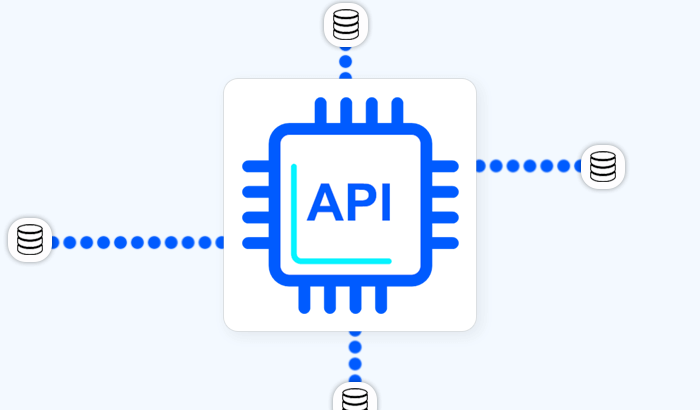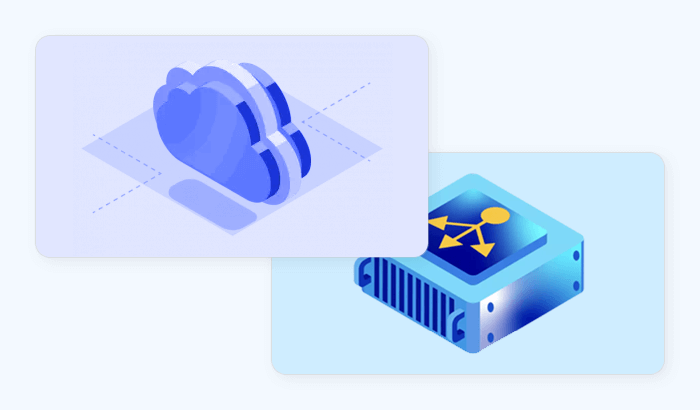- Step 1: Understand Why You Need IP Addresses from a Specific Country
- Step 2: Consider the Type of Proxies You Need
- Step 3: Things You Need to Consider Before Buying Proxies
- Step 4: Understand Proxy Use Cases for Businesses
- Step 5: Understand Proxy Pricing Models
- Step 6: Consider The Difficulty of Setting Up and Configuring Proxies
- Frequently Asked Questions
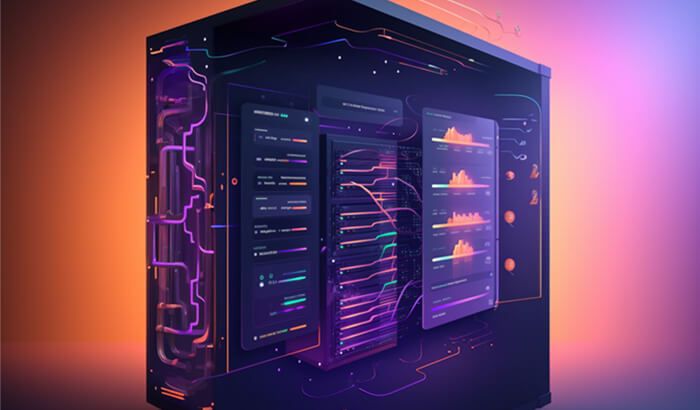

Proxies are powerful tools that can help you access, collect, and analyze data from the web. In this article, you will learn how to buy proxies, different types of proxies, their use cases, and how to choose the best one for your needs among different proxy providers.
Step 1: Understand Why You Need IP Addresses from a Specific Country
One of the main reasons to buy IPs from specific countries is to access geo-restricted content. Many websites and online services use geo-blocking techniques to limit their availability to certain regions. For example, if you want to watch Netflix US, you need to have a US IP address. Otherwise, you will see a different library of content or an error message. By using a proxy with a US IP address, you can trick Netflix into thinking that you are located in different countries.

Another reason to buy IPs from specific countries is to bypass censorship and surveillance. Some countries have strict internet regulations that prevent their citizens from accessing certain websites or expressing their opinions online. For example, China blocks many popular platforms like Google, Facebook, Twitter, and YouTube. By using a proxy with an IP address from a different country, you can circumvent geo-restrictions and access the free and open internet.
A third reason to buy proxies from specific countries is to perform web scraping tasks. However, many websites do not like web scrapers and use anti-scraping measures to block or ban them. By using a proxy with an IP address from the same country as the target website, you can reduce the chances of being detected and blocked. For instance, if you want to scrape Amazon UK, you need to have a UK IP address. Otherwise, you may face CAPTCHAs, rate limits, or IP bans.
Step 2: Consider the Type of Proxies You Need
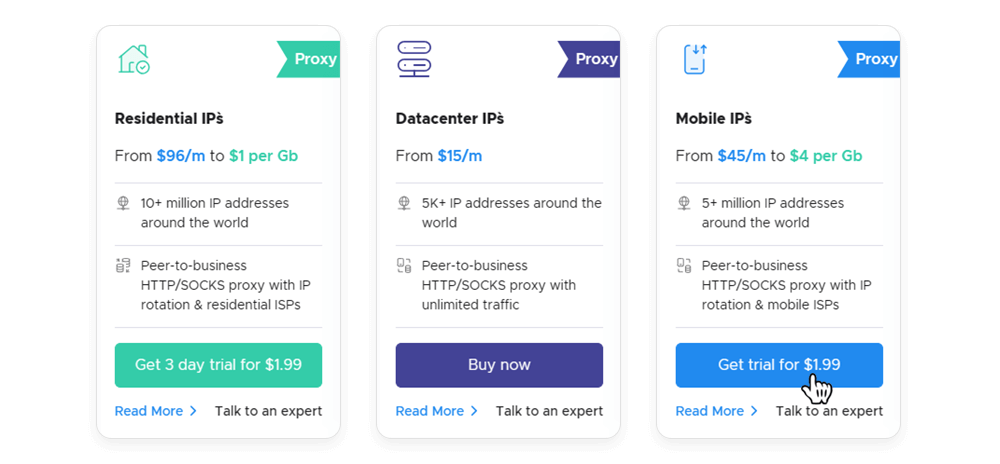
Proxies come in different types – this breakdown of proxy types can help you understand the pros and cons of each one:
Shared Proxies
These proxies are used by multiple users at the same time. They are usually cheaper than dedicated proxies, but they may have lower performance, security, and reliability. Shared proxies are suitable for simple tasks that do not require high anonymity or speed, such as web browsing, social media, or content access.
Dedicated Proxies
Dedicated proxy servers are assigned to a single user and not shared with anyone else. They are usually more expensive than shared proxies, but they offer higher performance, security, and reliability. Dedicated proxies are ideal for tasks that require high anonymity or speed, such as web scraping, SEO, or online gaming.
Residential Proxies
A residential IP can be sourced from internet service providers and residential devices, such as computers, smartphones, or smart TVs. They are usually more trustworthy and harder to detect than other types of proxies, but they may have lower speed and stability. Residential IPs are great for tasks that involve geo-restricted content, censorship bypass, or market research.
Datacenter Proxies
This proxy type uses IP addresses from data centers, such as web servers or cloud services. Unlike residential proxies, they may be more easily detected and blocked by some websites. Data center proxies are good for tasks that involve high-volume requests, load balancing, or bandwidth optimization.
Mobile Proxies
Mobile proxies use IP addresses from mobile devices, such as smartphones or tablets. They are similar to residential IP addresses, but they have the added benefit of changing locations based on the cellular network. Mobile IPs are excellent for tasks that involve location-based services, mobile app testing, or social media marketing.
Rotating Proxies
Rotating proxies change IP addresses automatically after a certain period or number of requests. IP rotation is useful for tasks that involve data scraping, data extraction, or avoiding IP bans. Rotating proxies can be a subtype of either mobile, datacenter, or residential proxy, depending on the source of the IP addresses.
Static Proxies
Static proxies use the same IP address for the duration of the session. They are opposite to rotating proxies, and they are helpful for tasks that involve maintaining a consistent online identity, such as online banking, shopping, or voting. Static proxies can be either residential, data center, or mobile proxies, depending on the source of the IP address.
Step 3: Things You Need to Consider Before Buying Proxies
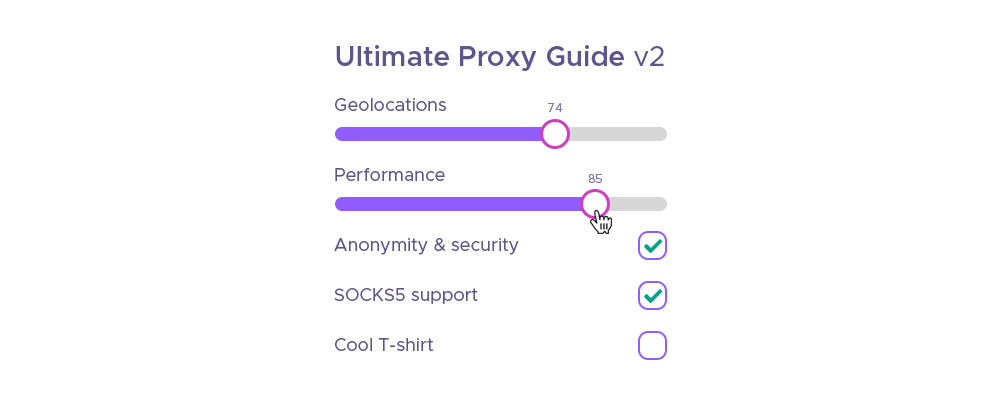
Learning how to buy a proxy is easy, but there are several criteria that determine the best proxy service providers on the market. These criteria include:
Level of Anonymity
The level of anonymity refers to how well a proxy can hide your IP address and other identifying information from the websites you visit. Depending on your needs and goals, you may want to choose a proxy that offers a high, medium, or low level of anonymity.
Infatica's anonymous proxies use real IP addresses from real users and devices, making them indistinguishable from regular web traffic. Infatica also offers IP rotation and geo-targeting features, allowing you to switch IPs as often as you want and access data from a specific location.
Speed and Performance
The speed and performance of a proxy depend on various factors, such as the bandwidth, latency, stability, and reliability of the proxy server. Fast and reliable proxies can improve your web browsing experience, reduce loading times, and handle high-volume requests. A slow and unstable proxy can cause delays, errors, and interruptions in your online activities.
Infatica is a proxy provider that offers fast and reliable proxies that deliver optimal performance and minimal downtime. Infatica's proxies use high-speed connections and unlimited bandwidth, ensuring that you can access any website or service without any lag or interruption. Infatica also monitors and maintains its proxy network, ensuring that its web server is always up and running.
Geographic Location
The geographic location of a web proxy server refers to the country or region where the proxy server is located. The location of a proxy can affect your access to certain websites or content, as well as the quality and accuracy of the data you collect. Depending on your needs and goals, you may want to choose a proxy that is located in the same or a different location as your target website or service.
Infatica offers proxies that cover over 150 countries and regions across the world. You can choose from millions of IP addresses from different locations, and access any website or service as if you were in that location. Infatica also allows you to geo-target your proxies, meaning that you can specify the exact location you want to use for your proxy.
Protocol Types (HTTP, HTTPS, SOCKS)
Infatica supports all major proxy protocols:
- HTTP proxies are the most common proxy type. They use the HTTP protocol, which is compatible with most websites. They are easy to use and configure, but they only support web traffic and do not encrypt your data.
- HTTPS proxies are similar to HTTP proxies, but they use the HTTPS protocol, which is a secure version of HTTP. They support web traffic and encrypt your data, providing an extra layer of security and privacy.
- SOCKS proxies are more versatile than HTTP or HTTPS proxies. They use the SOCKS protocol, which is a low-level protocol that can handle any type of traffic, not just web traffic. They can also support UDP traffic, which is used for streaming or gaming.

Step 4: Understand Proxy Use Cases for Businesses
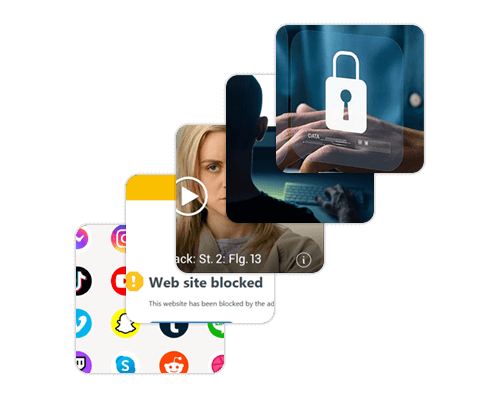
Proxy services have diverse uses in various areas. For example:
- Price aggregation: Proxies can help price aggregators collect and compare prices from different e-commerce websites without being blocked or detected. Proxies can also help them access geo-restricted content and display accurate prices for different regions.
- Cybersecurity: Proxies can enhance cybersecurity by masking the IP address and encrypting the internet traffic of users or devices. Proxies can also help protect against DDoS attacks, cyberattacks, and malware by filtering and blocking malicious requests.
- Marketing: Proxies can help marketers and advertisers reach and engage their target audiences on different platforms and channels. Proxies can also help them create and verify ads, monitor and protect their brand, perform account management, and collect and analyze market data.
- Brand protection: Proxies can help brand owners monitor and protect their online reputation, trademarks, and intellectual property. Proxies can also help them detect and prevent counterfeiting, fraud, and unauthorized use of their brand assets.
- IT departments: Proxies can help IT departments manage and control the internet usage and access of their employees or clients. Proxies can also help them improve network performance, security, and reliability by caching, filtering, and load balancing web requests .
- Uptime and performance tracking: Proxies can help website owners and developers monitor and test the uptime and performance of their websites from different locations and devices. Proxies can also help them create artificial loads, simulate user behavior, and identify and resolve issues.
- Data-as-a-Service: Proxies can help reliable providers collect and deliver high-quality and relevant data to their customers. Proxies can also help them bypass web restrictions, avoid IP bans, and ensure data privacy and security.
- SEO services: Proxies can help SEO professionals and marketers gather and analyze data about competitors, keywords, rankings, and trends. Proxies can also help them optimize their websites, content, and campaigns for different search engines and regions.
- Academia: Proxies can help academic researchers access and collect data from various sources that may be restricted or censored in their country or institution. Proxies can also help them improve their online privacy, security, and efficiency.
- Government: Proxies can help government agencies and officials provide and access online services and information securely and reliably. Proxies can also help them interact with the public, other agencies, and foreign entities without revealing their identity or location.
Step 5: Understand Proxy Pricing Models
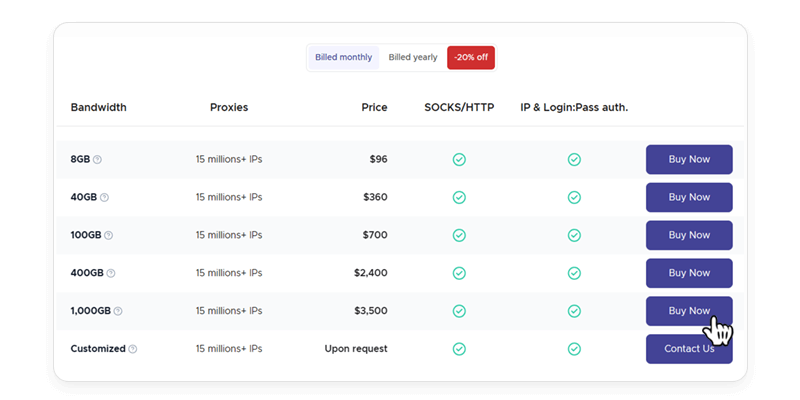
Here are some points to consider when comparing to different proxy pricing models and services cost:
Pay-per-IP: This pricing model charges you based on the number of IP addresses you use. It is suitable for tasks that require a fixed or dedicated IP address, such as online banking, shopping, or voting. However, it can be expensive and inflexible if you need to change or rotate your IP addresses frequently.
Pay-per-GB: This pricing model charges you based on the amount of data you use. It is suitable for tasks that require a high volume of requests, such as web scraping, data extraction, or SEO. However, it can be unpredictable and variable depending on the size and complexity of the web pages you access.
Pay-as-you-go: This pricing model allows you to pay only for what you use, without any monthly or annual commitments. It is suitable for tasks that have irregular or occasional needs, such as market research, content access, or censorship bypass. However, it can be less cost-effective and reliable than a subscription-based plan.
Infatica is a provider offering a transparent and flexible pay-per-GB pricing structure that adapts to your needs and goals. You can choose from a variety of plans that offer different features, such as bandwidth, proxies, locations, and protocols. Infatica also offers a 3-day trial for $1.99 on any plan, so you can test proxies’ quality and performance before making any financial commitment.
Step 6: Consider The Difficulty of Setting Up and Configuring Proxies
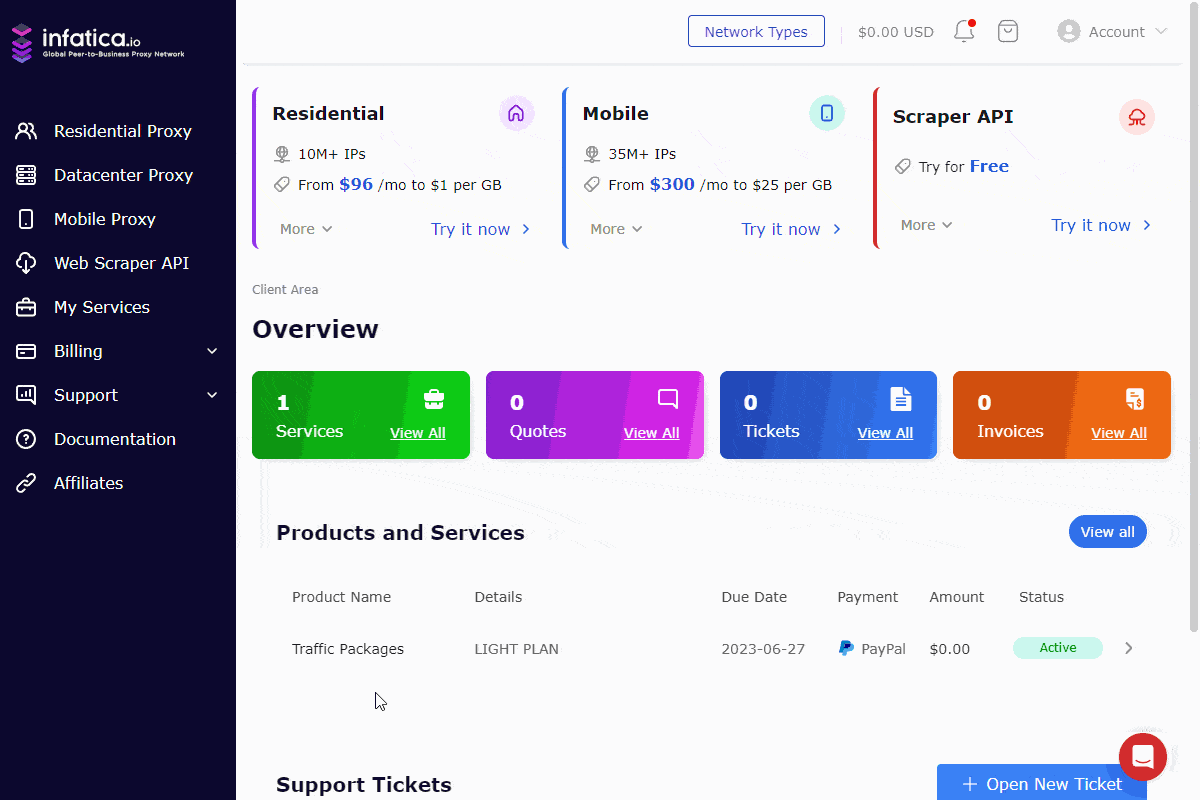
Log in to your Infatica account and go to the My Services section. There, you will see the proxy package that you have subscribed to. Click on it and then click on the Generate Proxy List button. You will see a window where you can enter the proxy settings. Select the default proxy format, host:port:username:password.
After you enter the settings, click on the Generate button. You will see a list of generated proxies – you can now use this proxy list with an anti-detection browser, web scraping bot, etc.
Final Words
In this article, you have learned how to buy proxies, different types of proxies, their use cases, and how to choose the best one for your needs. You have also discovered how Infatica can provide you with reliable, ethical, and high-performance proxies that cover over 150 geolocations and support all protocol types. Try Infatica today and see the difference when buying proxies for yourself!





